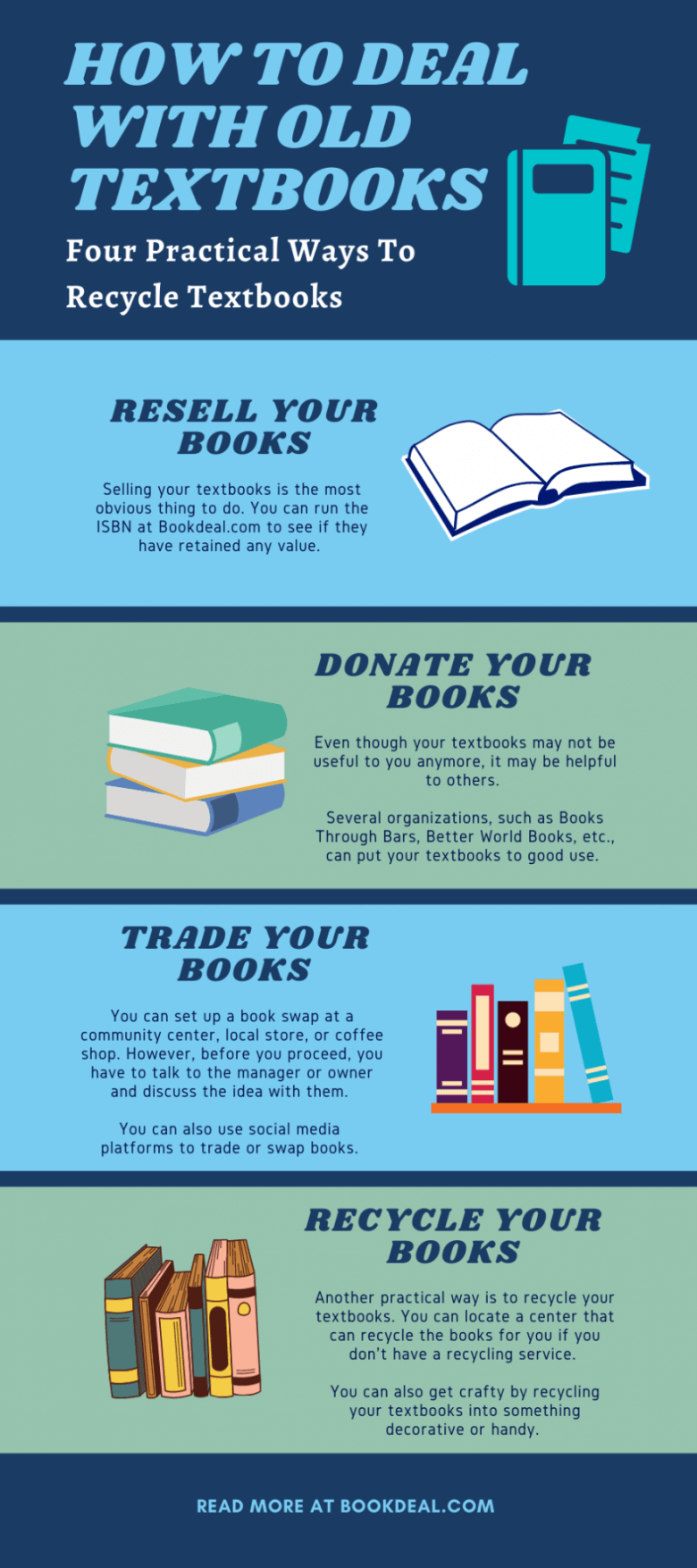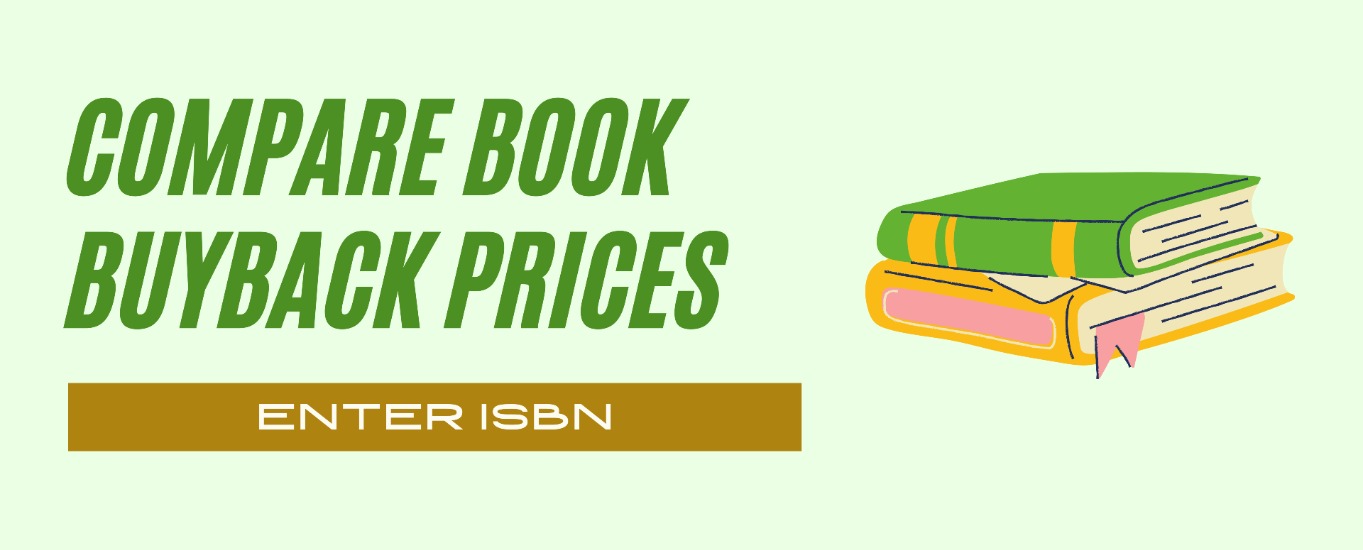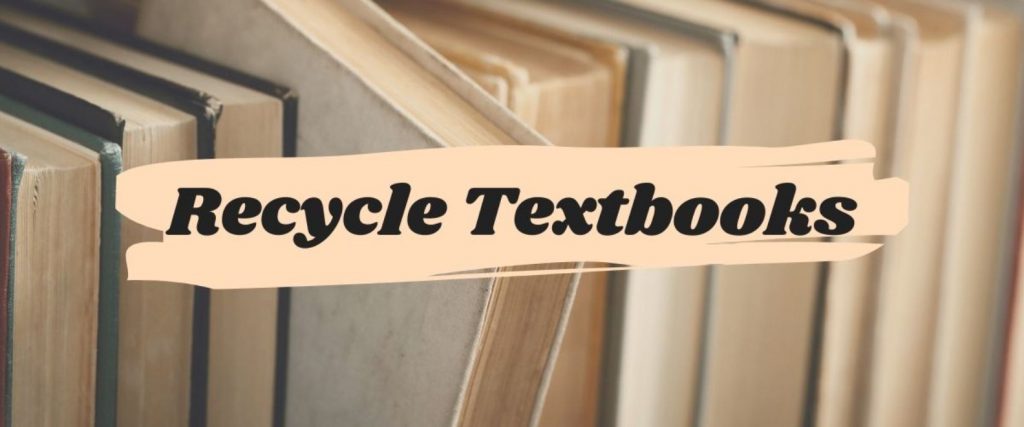Do you have mountain loads of textbooks and don’t know what to do with them? If so, then you may have to recycle textbooks.
But don’t worry; you’re not the only one looking for ways to recycle college textbooks.
This is what we mean.
According to the survey conducted by OnCampus Research, most college students use 5-7 textbooks minimum for each semester and at least 40-60 within a four-year program.
That’s a lot of books, so it’s not unusual to have unwanted textbooks accumulating dust.
This article will show you how and where to recycle textbooks, sell books online, or trade them.
We will also show you how to get paid to recycle books.
Let’s get into it.

Where To Recycle Textbooks
#1 Recycle Textbooks By Selling Them.
One way to recycle old books is to sell them. When you sell textbooks online, you get paid to recycle books.
Before you sell your textbooks, you need to undergo a necessary process.
The process will ensure that you get a good deal at the buyback vendor.
When selling used books, better conditions mean greater demand, selling it at a higher price.
If it’s in a worse condition, it won’t be easy to sell. And that’s because a potential customer wants a clear and honest description of its physical condition.
Here are ways to check the condition of your textbook before reselling it.
Booksellers use this process to determine the amount you get for reselling your book. It can be of great help to you.
Remember that you can use the definitions below for reference only.
Based on their requirements, most booksellers prefer to use these terms, including other unique ones.
So if you want more clarification, you can contact the bookseller for further information.

As New:
This term refers to a book in the same perfect condition as when it was published.
It could be a book’s description missing in the warehouse for years, never opened, shelved, or thumbed. But it’s still many years old.
Like New (LN):
When a book is described as Fine, it’s almost the same as “As New.” However, the book may have been opened and read many times.
But there are no damages or defects to the pages, jacket, or the book itself.
Very Good (VG):
The Very Good describes a book with small deterioration or wears, but there is no tear on the paper or binding.
The bookseller must note any small defects it has.
Good (G):
It describes a book that has an average worn book that’s used. It has all the leaves or pages of the book available.
Take note: the bookseller should let you know any defects the book has.
Fair:
The Fair describes a worn book, but it contains all the complete text pages.
And that includes plates or maps but may not have half-title, endpapers, etc.
If the book has any binding, jacket, etc., it may also be worn. The bookseller must indicate all the defects of the book.
Poor:
It describes a highly worn book. The bookseller should be able to indicate all the pages that are missing.
The book may be stained, spotted, soiled, may have loose hinges, joints, pages, etc.
Binding Copy:
The Binding Copy describes a book with all the leaves or pages in the right condition but has bad, off, loose, or non-existent binding.
Reading Copy:
This describes a copy in Poor to Fair condition and has all the text in a readable manner.
But aside from that, there is nothing else. Of course, you can read the text, but that’s just it. Nothing more.
These are how the booksellers will grade your book. With this information, you can know the steps to know where to recycle textbooks.
By the way, BookDeal.com provides the most reliable way to sell your textbooks at a higher price and guarantees your payment.
It’s the easiest way to recycle textbooks.
#2 Donate Your Books

Donation is another way to recycle old books. Yes. The textbooks may not be relevant to you anymore, but they can be highly beneficial to someone else.
Numerous organizations make it simple for you to recycle textbooks.
And they all serve diverse groups and communities, making book donations an exciting experience.
Why?
Because you get to donate to an organization that gives you a lot of meaning and a sense of fulfillment.
So, you know that your books will be used for a great cause.
Here are a few options on where to donate your textbooks:
Libraries
There is no doubt that libraries are the pillars of any community.
They offer access to knowledge, enhance literacy, and provide a safe and quiet place for everyone to learn.
Donating your textbooks to your local library will help them add to their collection.
The librarians can also resell the books to help them fund other equally important programs.
Goodwill
Goodwill has been serving various local communities for more than 115 years by selling donated items.
They then use the proceeds to fund their career training and other related services like childcare and supplemental education for those in dire need.
You can check out Goodwill’s official website to learn more about what they do.
You can also find a Goodwill location near you.

Salvation Army
You may not know, but Santa has collected donations for the Salvation Army before Christmas.
However, did you know that you can give away your textbooks?
The donations go to the Salvation Army Family Stores, and they use the funds raised to start excellent programs.
It’s one of the best programs to recycle textbooks.
Better World Books
The Better World Books accepts your book donations and gives them to people in need.
The organization also offers literacy grants to libraries and non-profits and protects the environment from unnecessary waste.
You can search the Better World Books official website to learn more about the shipping process or locate a drop box nearby.
Books Through Bars
Do you want to help inmates acquire vital education and training? If so, then Book Through Bars is one of the best options.
The organization collects various books, from entertainment and instructional books to your textbooks. No book is irrelevant.
However, before you recycle textbooks through Books Through Bars, read through their checklist and guidelines first.
That’s because they don’t accept hardcover and specific book types.
Books For Africa
Books For Africa is another great organization to send your textbooks too if you want to know where to recycle used books.
They accept almost any type of book and ship them to Africa to enhance the education conditions of those in dire need.
You can check out their website and follow their procedure.
These are a few places where you can donate your textbooks, but more is out there.
So if these lists are not what you prefer, you can search for the best that suits you.
#3 Trade Your Textbooks

Trading them is another option to recycle textbooks.
You can establish a book swap at a store, community center, or a local coffee shop.
It can be an exciting way to give your textbooks to someone who might urgently need your book.
You may also find a new favorite book for yourself.
Before you proceed, contact the venue manager or owner and explain what you plan to do. Do this before you commence.
You can also opt for social media platforms to find and meet other colleagues or students from your school or area.
You can create a book swap group where you can share your textbooks with the group members.
Furthermore, you can use websites such as PaperSwap Books.
The site allows users to make a list of books they want to share with the community and request any book they want to read.
Think of it as borrowing a book from a friend, except that you have endless friends with millions of readers.
#4 Recycle Textbooks

If all the steps mentioned earlier fail, and you can’t figure out what to do with your textbooks, throwing the books away may seem the best option.
But before you step out and throw it in the trash can, consider recycling.
According to a recent survey from the Environmental Protection Agency, “Paper and Paperboard” constitute 25% of the 17.8 million tons of waste produced.
You can recycle textbooks and play a significant part in decreasing the waste by:
Book Recycling
If your textbook is a paperback, you can recycle it by dumping it in the proper bin.
If you want to recycle books with hardcovers, you will have to remove the cover first. (Don’t forget the spine too).
And that’s because it contains materials such as threads, glue, and plastics.
Find A Center
If you don’t have a recycling service and don’t know where to recycle textbooks, use Berecycled.org.
The website can help you find commercial and government alternatives in your area.
Get Crafty
Another way to recycle textbooks is to get crafty.
You can take the books out of the landfills and make something handy or decorative. The possibilities have no end.
You can get inspiration online and create unique artifacts.
Remember that every help, regardless of how small, is essential.
Whether you recycle textbooks, sell or donate them, you help reduce waste, support a community in need or both.
It’s all up to you to decide.
Why Is There A Need To Recycle Textbooks?
Do you know the amount of waste old textbooks generates in a year? It’s unbelievable!
The United States National Wildlife Federation researched with textbook publishers and the United States Environmental Protection Agency.
The research was about the number of books dumped in landfills each year.
They found out that 640,000 tons of books were thrown into landfills annually.
And what’s worse, the landfills in the United States are reaching their total capacity, according to Global Citizen.
We have less than 18 years to find other alternatives before the landfills become full.
Of course, not all the waste comes from textbooks, but it significantly adds.
The United States has already begun exporting waste to other countries.
These should be a good enough reason to reconsider before throwing anything away, especially books.
So always find the time to recycle textbooks to help save the environment.
Recycle Textbooks: Effective Ways To Recycle Paperback Books
Compared to hardback books, recycling paperback books are usually much more straightforward.
However, you should still take a few steps.
First, check for brown paper and liquid-splattered sheets. Then, throw the mingled paper in the garbage if this is the case.
There is no need to take anything out of magazines. You can leave staples and cardboard advertisements, for example.
If the magazine came in a plastic bag, remove it and recycle it separately.
Overall, because each city is unique, check to see if your local government offers a book recycling program and what the requirements are.
The more you learn about the recycling program, the less likely a book will end up in a landfill due to its inability to be recycled.
Conclusion
As you probably have seen, it’s essential to recycle textbooks. Yes, books are like lectures or vacations; it’s hard to get rid of.
They take us on a journey or teach us something new at some moment.
As a result, we usually end up with a collection of books that we don’t need and have not used in years. That’s why it’s highly crucial to recycle textbooks.
If you want to recycle college textbooks, follow the detailed list outlined in this guide. In addition, it gives you information on where to recycle used books.
If you are searching for the best place to resell your textbooks, we can help you. We understand that reselling your book can be a bit challenging.
We make it easy for you to sell your books and get paid.
We partner with a vast network of reliable book-buying organizations.
So, go ahead, run the ISBN code of your book, and list it for sale on our website!

FAQS
1. How do I recycle paperback books?
Ans: You can recycle paperback books just like any other paper products: recycle, sell, or donate. You can place your paperback books in the “Mixed Paper” bin at your local recycling center, and there are numerous organizations that will accept your books. If you want to sell and earn some cash, you can sell them online at various bookselling sites such as BookDeal.com.
2. Where can I recycle old phone books?
A: You can recycle your old phone books through curbside recycling programs. They accept phone books as mixed waste paper. If your community doesn’t have curbside recycling pickup, you can send it to the local recycling depots. If your phone books are covered in any plastic, please separate plastic before recycling the phone books.
3. Where to recycle books in Portland?
You can download the South Portland Recycles app if you reside in Portland. You can use the app to check your address’s pickup schedule and add trash set-out reminders to your calendar. You can even find out how to dispose of your books through the recyclopedia. Finally, you can check out South Portland’s trash and recycling if you want more information.
4. Where do I recycle books in St. Louis?
The City of St. Louis provides fully implemented residential recycling services you can use. Check out St. Louis drop-off recycling locations if you find where to recycle your books. Also, check out St. Loui’s official site if you want to recycle at school, home, or work.
5. Where can I recycle books in Denver?
You can recycle your books at your local recycling center. You can also donate your books to various charitable organizations and bookstores such as Bookbag, Black & Read, The Book Rack, etc.
6. Where can I recycle books in Texas?
Based in Texas, you can check out Recycled Books Records CDs, DFW Book Recycling, or Recycled Reads Bookstore. If you want a schedule for a recycling and reuse drop-off center, check out AustinTexas.gov.
7. Where do I recycle books in San Diego?
There are several places you can recycle your books if you live in San Diego. Some of the places are Friends of the San Diego Public Library, Recycling Center San Diego, Sand Diego Free E-Waste Drop Off, etc. You can also sell your books online if it’s in good condition.
8. Where can I recycle books in California?
In California, you can recycle your books at Recycle Bookstore West or Recycle Bookstore. You can also check out the Where to Recycle Map to find the nearest recycling center.
9. Where can I recycle books in New York?
You can check out numerous recycling websites such as Freebird Books & Goods, Big Reuse, The Junkluggers of New York City, or New York Recycling. You can also sell your books on BookDeal.com and earn a reasonable price.

[…] you have textbooks and might’t promote them, don’t throw them away but. There are numerous ways to recycle those textbooks. So at all times hold your choices […]